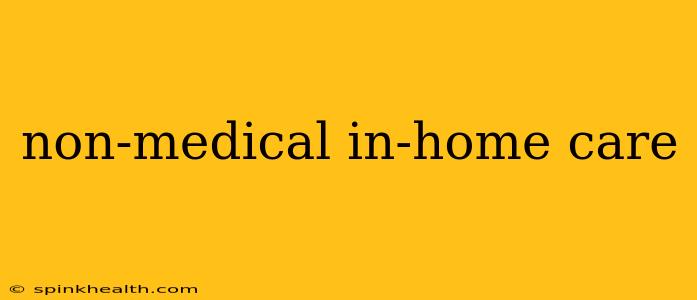The gentle click of the latch, the comforting aroma of freshly brewed coffee, the quiet hum of a familiar environment – home. For many, especially as they age or face health challenges, maintaining that familiar comfort and independence becomes increasingly difficult. This is where non-medical in-home care steps in, offering a lifeline of support that preserves dignity and promotes well-being. It's more than just assistance; it's about fostering a sense of security and enabling individuals to remain in their cherished homes for as long as possible.
This isn't about replacing family or friends; instead, it's about supplementing their care and providing an extra layer of support when needed. Let's delve deeper into this vital service and answer some common questions.
What exactly is non-medical in-home care?
Non-medical in-home care encompasses a wide range of services designed to assist individuals with daily tasks they may find challenging. Think of it as a personalized support system tailored to meet individual needs. It could include anything from help with bathing and dressing to meal preparation, light housekeeping, medication reminders (without administration), transportation to appointments, and companionship. The core focus is on maintaining independence and improving the quality of life, all within the comfort and familiarity of the person's own home.
What are the benefits of non-medical in-home care?
The benefits extend far beyond practical assistance. Imagine the peace of mind for both the individual receiving care and their loved ones. This peace of mind translates into:
- Improved Quality of Life: Maintaining independence and remaining in a familiar environment significantly boosts emotional well-being.
- Reduced Hospitalizations: Proactive support can prevent falls and other accidents that might otherwise lead to hospital stays.
- Delayed Nursing Home Admission: For many, in-home care provides a viable alternative to more expensive and potentially isolating nursing home placement.
- Increased Social Interaction: Caregivers can provide companionship and engaging activities, combating loneliness and isolation.
- Family Support: Family members can regain some of their own time and reduce the burden of constant caregiving.
What types of people benefit from non-medical in-home care?
The spectrum of individuals who benefit is surprisingly broad. It's not solely for the elderly; non-medical in-home care can be a vital support system for:
- Seniors: Assisting with daily tasks, promoting safety, and providing companionship.
- Individuals with Disabilities: Providing personalized assistance tailored to specific needs.
- Those Recovering from Surgery or Illness: Offering support during the recovery process.
- New Parents: Providing temporary assistance with newborn care, allowing parents time to rest and recover.
How do I find a reputable non-medical in-home care agency?
Choosing the right agency is paramount. Thorough research is key. Look for agencies that:
- Are licensed and insured: This ensures compliance with safety and quality standards.
- Conduct thorough background checks on their caregivers: Safety and trust are essential considerations.
- Provide personalized care plans: The care should be tailored to the individual's specific needs.
- Offer clear communication and regular updates: Open communication builds trust and ensures everyone is on the same page.
- Have positive client reviews and testimonials: Online reviews can provide valuable insights into the agency's quality of service.
What does non-medical in-home care cost?
The cost of non-medical in-home care can vary widely depending on factors such as location, the level of care required, and the number of hours of service. It's essential to obtain quotes from multiple agencies to compare pricing and services. Some agencies may offer flexible payment options or accept long-term care insurance.
How do I know if in-home care is right for my loved one?
This is a personal decision that should be made in consultation with family, the individual needing care, and their physician. Consider the level of assistance required, the individual's overall health, and their desire for independence. A frank discussion about needs and capabilities is crucial in determining the best course of action.
Non-medical in-home care isn't just about providing assistance; it's about preserving dignity, promoting independence, and enhancing the quality of life. It's a valuable resource for families and individuals facing the challenges of aging or disability, allowing them to remain comfortable and connected in the place they call home.

